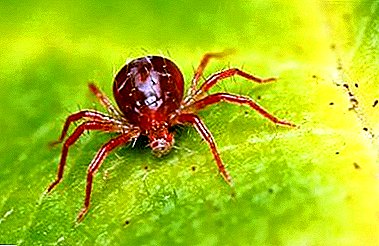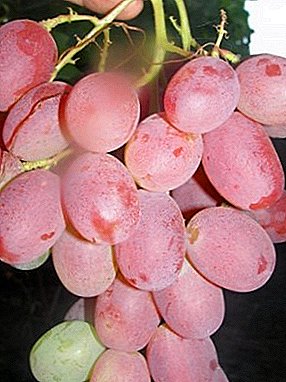
Hibiscus - a plant whose homeland is China. That is why sometimes called hibiscus "Chinese rose". He is also known Red Rose and carcade. It grows well in warm or temperate climates. There are about 300 species of this beautiful plant in the world.
Chemical composition
Chinese rose is rich in nutrients that make it efficiently used. in traditional medicine. Hibiscus contains:
- malic, tartaric, citric acid;
- flavonoids;
- polysaccharides;
- anthocyanins;
- pectin;
- vitamins P, C;
- minerals;
- amino acids;
- glucose.

Beneficial features
Useful properties of Chinese roses are diverse. The plant is used as an external agent in the form of applications on boils, boils. To do this, rub the flowers and leaves of hibiscus and apply to the problem area of the skin. The sap of the plant helps to fight juvenile acne and inflammation.
Due to the huge amount of fruit acids, Chinese rose is used when elevated temperature. A drink made from hibiscus does not provoke the formation of kidney stones, as it does not contain oxalic acid.
 Due to the content in the plant of vitamins C and P, the raw materials are used for strengthen blood vessels. Anthocyanins help to reduce the rate of formation of fat in the body. That is why it is used as a tool to help cope with overweight.
Due to the content in the plant of vitamins C and P, the raw materials are used for strengthen blood vessels. Anthocyanins help to reduce the rate of formation of fat in the body. That is why it is used as a tool to help cope with overweight.
The combination of active substances has the property to reduce the level of cholesterol in the blood. Known and choleretic funds of this amazing plant. The infusion made from flowers helps to restore liver cells, excrete metabolic products that cause various diseases and early aging.
Rose polysaccharides have sorbing properties due to which the body is cleansed from toxins.
The rich composition has a positive effect on the human immune system, increasing resistance to viral infections.
Due to its diuretic and antispasmodic properties, the drink from this plant helps to maintain normal blood pressure levels.
The presence of anti-inflammatory substances makes hibiscus a great help in treating bronchitis, pharyngitis, tracheitis, and cystitis.
 In folk medicine, the plant is used as anthelmintic agent.
In folk medicine, the plant is used as anthelmintic agent.
Fresh extract prepared from the sepals of Chinese rose promotes inhibit the growth of intestinal bacteriawithout disturbing the microflora in the intestine.
In Chinese medicine, plant extracts are used as a means of preventing the appearance of blood clots and improves blood circulation in all tissues of the body.
Indications and Contraindications
Indications:
Hibiscus is shown as a remedy:
- helps improve appetite;
- strengthens the vascular wall;
- choleretic and diuretic;
- antispasmodic;
- antimicrobial and anti-inflammatory;
- normalizing pressure;
- helps in the fight against overweight.
Contraindications:
Despite the large number of useful properties, hibiscus is contraindicated in:
- allergic reactions to this plant;
- with increased acidity;
- with existing gastritis or duodenitis;
- with peptic ulcer disease.

Hibiscus Tea
For karkade tea drink, use cups of flowers. To make healthy tea, the petals are placed in china and poured with hot water. You can cook this drink in glassware.
It is highly undesirable to use metal, as not only the color changes, but also the taste. This drink will get a grayish tint. When using brutal water, the color may turn green.
A glass of hot water requires at least one teaspoon of petals.
The drink is served not only hot but also cold. Some use brewed petals as food. dietary supplementcleansing and strengthening the body.
The benefits of hibiscus in tea
Frequent use of karkade tea works well with chronic constipation. The effect of this drink makes it very soft, but steady. For the treatment of such a problem, it is better to use karkade for 3 weeks, then it is better to take a week break and continue the course for another 10 days.
Drink karkade, subject to its regular use, helps eliminate hypovitaminosis and improve immunity. Such prevention is especially relevant in the period of a large number of viral infections.
 What parts of hibiscus can I use?
What parts of hibiscus can I use?
Karkade healing drink is made from petals hibiscus. Infusions from the leaves of the plant are used to restore the liver and improve the secretion of bile, as well as a laxative drink. For respiratory diseases also apply exactly leaves. As an external tool for applications, Chinese rose flowers are well ground.
Can I grow at home?
At home, growing hibiscus does not cause much trouble, as this plant is unpretentious. It is only important to provide the Chinese rose with sufficient lighting and timely watering. Hibiscus does not like drafts. Spray The plant is recommended regularly in order not to start a spider mite, which prefers dry air and high temperature. Once a month hibiscus is necessary fertilizecontaining a large amount of minerals and nitrogen. In winter, the plant can not fertilize or occasionally apply fertilizer containing potassium and phosphorus.
Young rose is required to repot every year, adult - once every three years.
 Hibiscus is an amazing plant with a whole range of useful properties. The plant can be used as an external agent in the form of applications, and internal in the form of tea from the petals or infusion of the leaves. Contraindications for internal use is not so much.
Hibiscus is an amazing plant with a whole range of useful properties. The plant can be used as an external agent in the form of applications, and internal in the form of tea from the petals or infusion of the leaves. Contraindications for internal use is not so much.
Hibiscus can be grown not only in the garden, but also at home. The plant is unpretentious and does not require special care.
Chinese rose has not only healing properties, but also the ability to improve the microclimate of the room.
A photo
Photo hibiscus, see below:
















